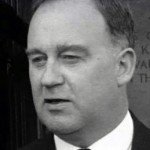 William Craig (1924-2011) was a Northern Ireland politician, prominent Loyalist and founder of the neo-fascist Ulster Vanguard. Craig was born in Cookstown in County Tyrone and educated in Dungannon, Larne and Queen’s University Belfast. Craig joined the Royal Air Force and served with bomber squadrons during World War II. After the war he completed his law studies, qualified as a solicitor and joined the Ulster Unionist Party. Craig won a seat in the Northern Ireland Parliament in 1960 and was elevated to the ministry three years later. He held a number of portfolios under prime minister Terence O’Neill, including health, development, home affairs and local government. Craig was dismissive of the civil rights movement, considering it a front for the Irish Republican Army (IRA). In October 1968 he heightened tensions by banning a civil rights march in Derry. This decision, along with some provocative public remarks, saw Craig dismissed from the O’Neill ministry in December 1968.
William Craig (1924-2011) was a Northern Ireland politician, prominent Loyalist and founder of the neo-fascist Ulster Vanguard. Craig was born in Cookstown in County Tyrone and educated in Dungannon, Larne and Queen’s University Belfast. Craig joined the Royal Air Force and served with bomber squadrons during World War II. After the war he completed his law studies, qualified as a solicitor and joined the Ulster Unionist Party. Craig won a seat in the Northern Ireland Parliament in 1960 and was elevated to the ministry three years later. He held a number of portfolios under prime minister Terence O’Neill, including health, development, home affairs and local government. Craig was dismissive of the civil rights movement, considering it a front for the Irish Republican Army (IRA). In October 1968 he heightened tensions by banning a civil rights march in Derry. This decision, along with some provocative public remarks, saw Craig dismissed from the O’Neill ministry in December 1968.
As Loyalists in the ranks of the UUP lost faith in O’Neill they gravitated around Bill Craig. When James Chichester-Clark resigned in March 1971 Craig ran for the UUP leadership but was narrowly defeated by Brian Faulkner. In February 1972 Craig, together with fellow MPs Martin Smyth and Austin Ardill, formed the Ulster Vanguard. At first a Loyalist faction of the UUP, the Ulster Vanguard evolved into a separate party, formally titled the Vanguard Unionist Progressive Party (VUPP). The Vanguard became known for its Nazi-style rallies, some attended by more than 50,000 hardline Loyalists. Flanked by bodyguards, Craig would deliver thundering and provocative speeches, before before inspecting rows of mask-wearing Loyalist paramilitaries. At his worst, Craig preached anti-Catholic scuttlebutt and promised that Loyalists would, if necessary, “shoot to kill” and “liquidate the enemy”. Craig was elected to the newly formed Northern Ireland Assembly in 1973. He became a significant opponent of the Sunningdale Agreement, leading the 1974 Ulster Workers’ Council (UWC) strike that caused the agreement to collapse.
Craig moderated his views in the mid 1970s, advocating a power-sharing government with Nationalist parties. This triggered the dissolution of the Vanguard and Craig’s return to the UUP in 1978. As Ian Paisley‘s popularity and electoral fortunes increased, Craig’s withered. He lost his seat in the Assembly in 1979 and failed to secure reelection in 1982, despite reviving the Vanguard brand. Craig retired from politics and returned to practising law, commenting occasionally on the Troubles and the peace process. He died in April 2011 after suffering a devastating stroke.
© Alpha History 2017. Content on this page may not be republished or distributed without permission. For more information please refer to our Terms of Use.
This page was written by Jennifer Llewellyn and Steve Thompson. To reference this page, use the following citation:
J. Llewellyn & S. Thompson, “William Craig”, Alpha History, accessed [today’s date], https://alphahistory.com/northernireland/william-craig/.
